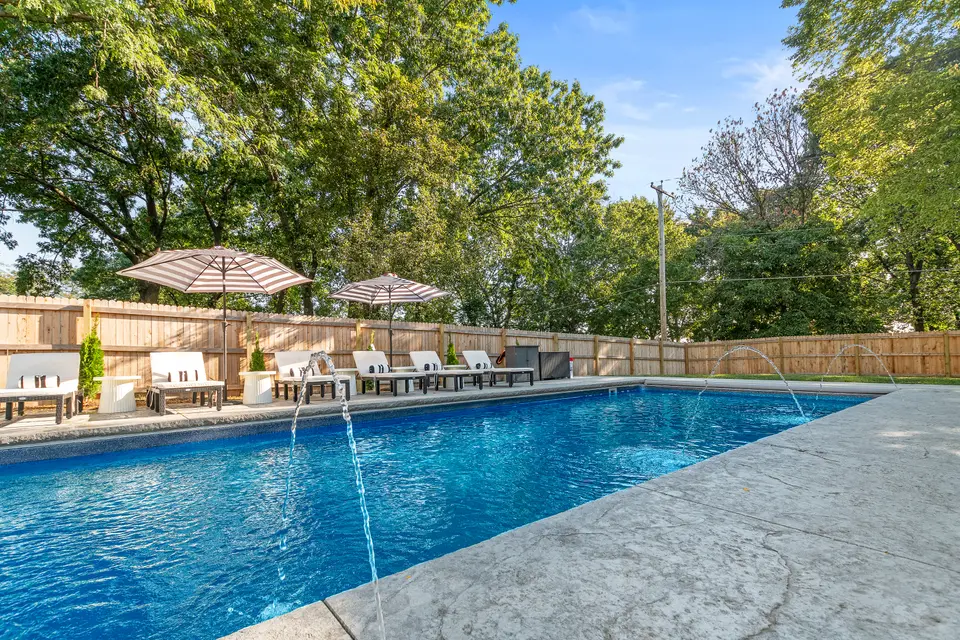Article Pool Water Evaporation: What Causes It and How to Prevent It (And a simple test to conduct if you suspect it is a leak) By Probuilt Staff June 15, 2022

Things have been heating up outside all across the country lately. Humidity levels are high, too. Of course, when you have a backyard pool, it’s nice to know you can just jump in and cool off on these sweltering days.
However, did you know that along with the heat and humidity (and other factors), your swimming pool is subject to water evaporation? It is highly important to keep an eye on the water level of your pool, as it can lose up to an inch (or more!) of water per week in evaporation alone. Plus, things you don’t think about can cause water loss in your pool. Doing too many cannon balls with the water splashing out onto the pool deck? What about all those wet bathing suits transporting water out of the pool? We are here to discuss how it happens and what you can do to prevent it.
Your backyard pool loses more water than you might even realize. In fact, it can lose up to ¼ inch daily. Over the course of a year, that adds up to a whopping 20,000 gallons of water! Your pool loses water for many reasons, the most common of which is from evaporation. And when the hot months of summer come into play, it can really mess with the water levels in your pool. But you don’t have to surrender to this activity. You should just be informed on what causes water loss and what you can do to prevent it.
What causes water evaporation?
1. Excessive direct sunlight
If your pool is subject to continuous sunlight, it will obviously be hotter than a pool that is shaded. The sun not only warms the water but also the surrounding areas. Because the sunlight increases the temperature in the pool, the process of evaporation increases. As a result, the excess heat is released in the form of vapors.
2. The outdoor temperatures vs. the temperature of the pool water
Yes, just the heat alone can cause the pool water to evaporate. Regardless of whether or not the sun is out, if there is a significant difference between the outdoor temperature and the temperature of the pool, evaporation will occur. Think of it this way: when you boil a pot of water on the stove, steam is released to get rid of the excess heat.
3. Leaks, splashing, and backwashing
If your pool is experiencing water loss in greater amounts than you think is normal, it could be related to other issues. This could include a leak, excessive filter backwashing, or the normal water splashing out of the pool as swimmers get in and out of the water.
If you are not sure if your pool’s water loss is from normal evaporation or from a leak, here’s a simple test you can do to determine the cause (source: medallionenergy.com):
- Make sure your pool is filled to mid-skimmer level.
- Grab a five-gallon bucket and fill it with water, leaving two inches at the top.
- Then, mark the water level within that bucket.
- Put the bucket on the first step in the shallow end. (Alternatively, you can put the bucket on the pool deck near the water.)
- Mark the water level of your pool.
- After a few days, measure the water loss in the bucket and in the pool in terms of inches lost. If they match, then evaporation is at work. However, if the water loss in the pool is more than the water loss in the bucket, you could potentially have a leak in your pool.
Ways to prevent evaporation in your backyard swimming pool
1. Cool down the water.
As mentioned earlier, water evaporation occurs when the pool water is hot. Granted, in many cases you want to warm up the water in your pool. However, it equally important to keep natural evaporation to a minimum. Therefore, you can reduce the temperature of the pool water with a pool heat pump. If you do not have a heat pump, you can opt to run your filter at night when it is cooler outside or add cold water with a hose.
2. Turn off any water fountains or waterfalls.
These are definitely nice to look at and they do add to the aesthetic appeal of your pool. However, because they increase the surface area of the water by spraying up and out, evaporation occurs even faster. Just keep these water features turned off when you really don’t need them.
3. Cover your pool.
Using a pool cover can prevent up to 95% of evaporation. Pool covers come in many types of materials and designs. They do more than help reduce and prevent evaporation, though. They also reduce chemical usage and cleaning requirements. Further, they provide a layer of safety to prevent children and animals from drowning.
Once you know what to do – such as covering your pool and controlling the water temperature - you can conserve more water and prevent excessive evaporation. You can then enjoy a premier pool and spa every day without worrying about losing too much water, getting more performance out of your pool.